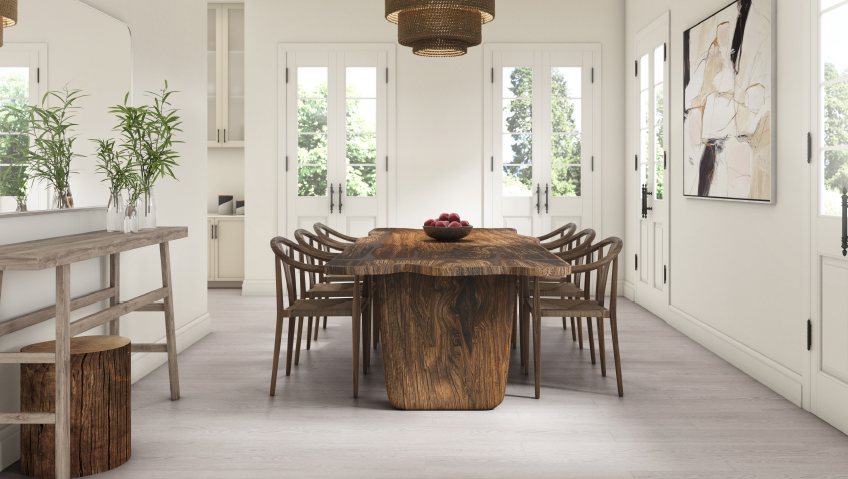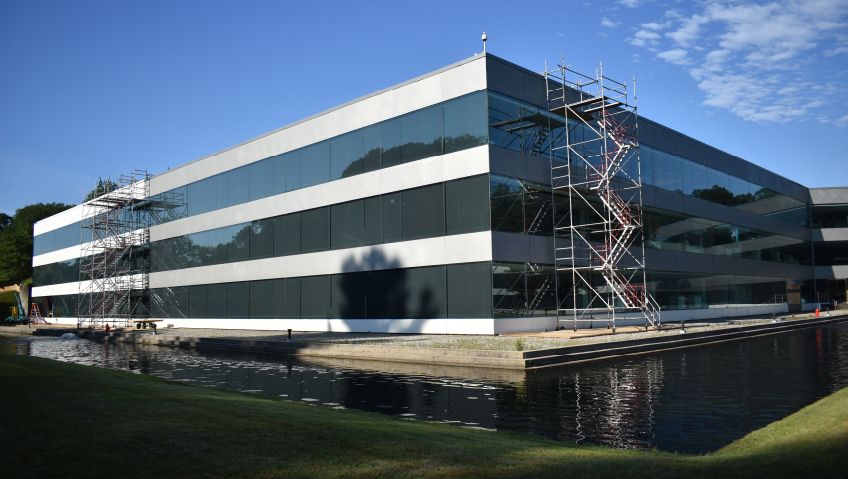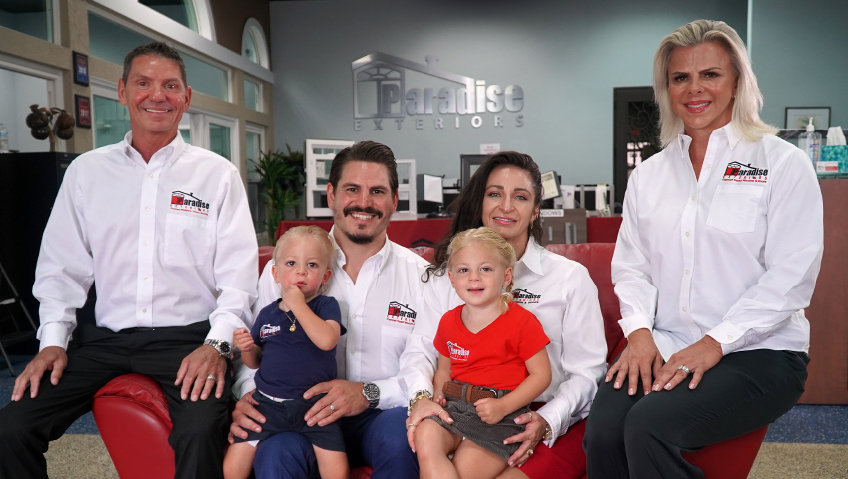Dr. Z.L. Wu founded Novalis Innovative Flooring in 1984, when he became the first manufacturer to ship luxury vinyl flooring from China to the U.S. At the time, only a few companies in the world had any involvement in the product, giving the insightful entrepreneur a unique opportunity to bring an emerging product to customers around the globe.
The company’s world-class products quickly earned an enviable reputation, and Dr. Wu’s business grew steadily. Today, Novalis remains family-owned and operated and boasts a presence in over 50 countries and six continents with its durable and versatile flooring options that have been used in numerous award-winning buildings around the world.
In addition to two production facilities in Zhenjiang, China, the company recently expanded its production capability with the 2020 opening of a new factory in Dalton, Georgia to meet a rising demand in the United States. The company maintains offices in Shanghai, Hong Kong, Hanoi, Cologne, and in North America in Richmond Hill, Ontario and Mooresville, North Carolina. The business boasts additional sales offices and distribution partners across Asia Pacific, Africa, Europe, and North America. Novalis employs 1,400 people worldwide and has 1,500 monthly container shipments to 50 destinations across six continents.
While the company has grown substantially over the decades, its core principles have remained consistent. “I think it’s a real benefit to Novalis that it’s still family-owned,” says Novalis Sustainability Manager Joost Luhmann. “We are able to have direct communication with ownership and routine meetings help us make decisions quickly. We are not moving slowly; we are always, I think, a bit ahead of our competitors.”
This ability to act swiftly ensures that the company stays ahead of any new technologies or potential issues that arise. “We were one of the first companies in our line of business who really focused on sustainability,” Luhmann says. “We have always invested in new technologies, and we are still driving initiatives in Europe, the U.S., and China when it comes to transparency and new product or sustainability standards.”
Novalis serves a variety of markets including single and multi-family residences, hospitality, retail, corporate, and education. To meet the needs of these markets, the company has developed the brands AVA, NovaFloor, and DuraDecor, all of which are known for their quality. “We are not the cheapest; we don’t want to be,” states Luhmann. “We don’t want to compete with market entry-level products. We consider ourselves a premium supplier.”
As Novalis’ commercial brand, AVA’s mission is to provide products that improve quality of life with aesthetic design and green processes. Inspired by nature, consumer trends, and high fashion, NovaFloor combines originality with modern aesthetics to provide beautiful, versatile, and sustainable products for the residential market. DuraDecor contains several chic, trendy visuals that come in a variety of styles, including peel-and-stick tiles, making this brand ideal for home improvement customers ready for an easy, do-it-yourself project.
Whatever the brand or target market, Novalis is fully committed to sustainability. This includes becoming carbon neutral by the year 2040 and actively working to reduce waste and reduce energy and water consumption. This commitment also requires complete transparency.
“We want to be the most transparent [luxury vinyl tile] manufacturer,” Luhmann affirms. Customers are eager to see proof of sustainability and the team is eager to provide that assurance. “They want this transparency from us, so we said, ‘Okay. We need to do something. We need to be ahead of the other manufacturers.’”
The company uses the latest technology to meet this demand for transparency and traceability. “For all of our products, we have developed a digital product passport,” he explains. This puts the company ahead of the curve as an early adopter of a technology that “will, at some point, also be required by EU legislation.” Leading in this area not only appeals to existing customers, but also attracts new customers who are committed to sustainability.
Novalis’ Digital Product Passport aims to quickly and clearly answer three key customer questions: Where does a product come from? What is it made of? Where does it go at the end of its life? A digital product passport allows consumers to view the details online, from lifecycle assessments to certificates and ingredients.
“This is accessible via a QR code on the back of the product,” Luhmann says. “All of our [AVA products] that are coming from China, from our Chinese operations, have engraved QR codes on the backside, and the customer, the end consumer, the installer, and also the recycler can scan it and see which ingredients are inside this product. We are disclosing all ingredients down to one hundred parts per million, so 0.01 percent.”
Novalis’ sustainability reporting provides additional transparency to its customers. “We did a comprehensive materiality assessment in 2022 together with SCS Consulting, where we asked all of our stakeholders which topics are the most important to them, what they want us to change. This also gave us some guidance for our strategy, for our targets.” The team has already put this knowledge to use, drawing on stakeholder feedback as they “implement some of the operating procedures to consistently report on our progress, to initiate a new project, for new product development, or for investments in renewable energy.”
Novalis has also created a sustainability committee to oversee its sustainability efforts and respond to growing regulatory requirements in Europe and North America. Membership is made up of the company’s CEO, Vice Presidents in Europe and North America, and Sustainability Managers. In addition to strategizing how to overcome today’s sustainably challenges, the committee is guiding the company with a vision for future sustainability efforts. By including executives and managers in both Europe and North America, it can better navigate the regulatory differences between the two markets. The North American managers mainly concentrate on operations in the United States, while the European portion of the committee focuses on European and Asian concerns.
As a whole, the committee is responsible for overseeing and guiding the company’s sustainability goals, ensuring that those goals are met, and driving change both within the company and throughout the industry. “We are coordinating all the different initiatives,” Luhmann shares. “We discuss it on a strategic level first, then break it down into smaller working items for our stakeholders.”
Armed with quality, market-leading products, a strong commitment to sustainability, and 40 years of success upon which to build, Novalis has a lot to look forward to.
“I think the future of the company is secured,” says Luhmann. “We have a great team. We are active in different market segments and areas. We are working with strong partners in the market.” The company will surely be one to watch as it continues to build on this solid foundation.






